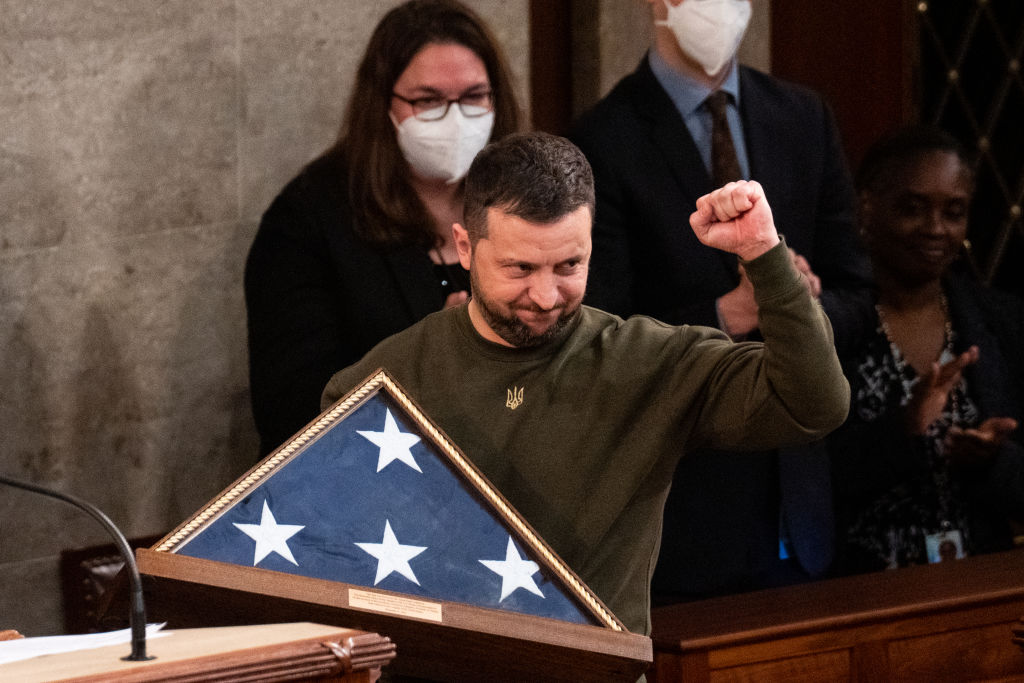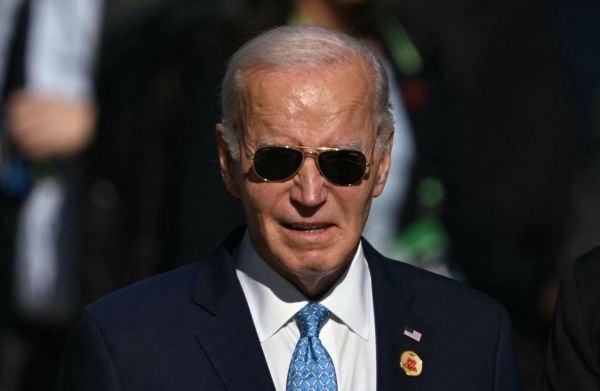Hello and happy Saturday. For those of you who celebrate, I hope your preparations are wrapping up, that the stockings have been hung by the chimney with care, and that you keep in mind that the most enduring traditions of the season are best enjoyed in the warm embrace of kith and kin.
This might sound weird, but Christmas came early for me this week when Ukrainian President Volodymyr Zelensky visited Washington. (And no, I’m not trying to evoke any religious imagery or parables.) I remember the first reports of explosions last February and fearing what would happen if, as many expected, the Russian military took the Kyiv airport and then rolled over the rest of the country with ease. The Morning Dispatch that we published hours after the invasion began concluded with a quote that ABC News’ Martha Raddatz shared, from a Pentagon official: “You are likely in the last few hours of peace on the European continent for a long time to come.” It felt ominous but accurate.
And indeed, it looks like it will be awhile before there will be peace on the European continent. But—to invoke a phrase from when clickbaity journalism began taking over the internet—not for the reasons you think (or at least would have thought back in February). Ukraine is, as Zelensky said memorably during his address to Congress, “alive and kicking.” The war continues because Ukraine is winning. Russia’s military isn’t what we thought it was (though at least a few people were aware), and Ukraine proved more resilient than anyone predicted. Many in the military had been hardened by fighting in the Donbas, where Russia invaded in 2014. The West rushed into help with military aid. And the Ukrainian people have displayed remarkable bravery. But also, Zelensky stayed. Reportedly, when the Biden administration offered to evacuate him, he replied, “The fight is here; I need ammunition, not a ride.”
Zelensky’s staying wasn’t merely symbolic—Ukraine reportedly thwarted multiple attempts by the Russians to assassinate him—but it was nonetheless a powerful symbol. Would Western nations have thrown so much into the war effort if he hadn’t? Would the people have stood so tall? Fortunately, those are questions we needn’t answer.
Zelensky’s trip to D.C. this week was another powerful gesture. He didn’t have to come. It was no doubt risky to have him travel to Poland to catch that long-ago-offered ride from the U.S. It’s possible, even likely, that Congress would have passed the omnibus spending bill that includes another round of funding without his visit.
But, as heartening as it was to see the welcome he got and as stirring as his words were, the symbolism isn’t just about Ukraine (at least for me). Our Capitol is a powerful symbol of its own. It stands for democracy and freedom and the power of the people. But for the last several years, it’s also served as a reminder of our dysfunction, home to infighting, intense partisanship, and even—let’s not forget—an insurrection.
But on Wednesday night, the Capitol welcomed a man who’s fighting for the very survival of his country. He spoke humbly and powerfully at the same time. He detailed what our nations have accomplished together and discussed how important it is to continue that work. He reminded us it’s still possible to do good things. Where too many others have served to diminish its stature, he restored a sense of dignity and purpose to a building that has seen too much silliness lately. And for that I’m grateful. Slava Ukraini.
Have a wonderful holiday and thank you for reading.
Ron DeSantis isn’t running for president—yet—but plenty of pundits have wondered how he might differentiate himself from Donald Trump if/when he does. We got a clue recently when DeSantis announced that he was petitioning the Florida Supreme Court to empanel a grand jury to “investigate any and all wrongdoing in Florida with respect to COVID-19 vaccines.” Andrew looks at the journey DeSantis has taken on COVID. While he was hailed by many on the right for keeping Florida more open than other states during the lockdown phases of the pandemic, he had largely been pro-vaccine. But Trump, for all his opposition to lockdowns and other COVID security measures, has also been pro-vaccine. (It lets him take credit for Operation Warp Speed, after all.) Andrew questions DeSantis’ move: “DeSantis using the vaccines as a wedge issue would make more sense as a political offensive if Trump still had an iron grip on the party. But it makes much less sense when Trump is already substantially diminished, reeling from legal defeats and an embarrassing slate of midterm losses.”
Zelensky’s visit was a source of consternation to many on the populist right who’ve opposed U.S. efforts in Ukraine, either out of “America First” logic or anti-anti-Putinism that borders on outright support for the Russian dictator. But the biggest gripe that many could come up with was that … Zelensky didn’t wear a suit to the White House or Capitol. Oh, does Nick have thoughts in Boiling Frogs. He thinks he understands what’s really bothering these folks, and it ain’t an olive-drab sweatshirt. “Watching Putin go belly up in Ukraine has dashed all sorts of political illusions. Your faith that strongmen are the best, most competent instrument for achieving political prerogatives is shaken. Your belief that woke Western militaries are no match on the battlefield for fascist machismo looks silly. Your hope of a great authoritarian victory over Ukraine that might inspire Americans to embrace nationalism and reject the global liberal order has disappeared along with 100,000 or so Russian soldiers. … Putin has embarrassed you in every conceivable way. Naturally, you hate Zelensky for it.”
That’s right, Stanford. Just go ahead and tell Jonah that certain words are unacceptable. It’s basically a triple-dog dare, and he’s very willing to stick his tongue on the frozen flagpole. But in this case, it works out very well for him and his lucky readers. Stanford recently created an “Elimination of Harmful Language Initiative” that seeks to eliminate certain words—crazy, insane … American?—from the discourse. He writes: “Stanford’s preferred replacements for stupid … are ‘boring’ or ‘uncool.’ Really? So when someone tells me they want to run with scissors I should say, ‘Don’t do it: That’s boring.’ Or when they tell me they want to drink puddle water outside a porta-John, I should tell them, ‘That’s uncool.’” He has a larger point, though, about the language police and their ultimate goal, which is power. “Creating shibboleths solely designed to weed out wrongthink and punish wrongthinkers is generally grotesque. They are not primarily purging the language of offensive words—they’re minting new reasons to be offended by existing, inoffensive words.”
And here’s the best of the rest:
- Normally I’d say, “Check out Haley in Uphill. She read the omnibus spending bill so you don’t have to.” But even Haley, superheroine though she may be, could not get through 4,155 pages in a couple of days. Still, she’s got the highlights, and it’s worth your time.
- We’ve got two pieces that remind us that it’s very much in America’s interest to continue funding the war effort, but for different reasons. Peter Doran and Ivana Stradner make the case that only a Ukraine victory can ward off an endless war in Europe, and Arthur Herman argues that the buildup of our supply off tanks, Humvees, and munitions that the war has necessitated will leave us in a better place to fight a multifront war should China move against Taiwan.
- Charlotte calls attention to a crisis that likely few know about: Iran’s mistreatment of its largest non-Muslim majority, the Baha’i. “Baha’is have suffered more than four decades of arbitrary detention, forced evictions, home raids, torture, and execution at the hands of the Islamic Republic,” she notes.
- In Capitolism, Scott Lincicome looks at the various regulations and tariffs and policies that make life more expensive for American families and notes the various measures that government uses or is considering using to ease that burden (lots of cash, mostly). He wonders if there isn’t another way.
- If you’ve been following the Twitter Files drama, check out David’s French Press from Tuesday. He explains whether the FBI’s dealings with Twitter in the runup to the 2020 election amount to First Amendment violations.
- Driving for the holidays? Catch up on the pods. David and Sarah’s Advisory Opinions conversation about the Twitter Files makes an excellent companion to David’s newsletter. On The Dispatch Podcast, the gang takes everyone on a wild ride rehashing the year that was. If you’ve ever noticed Jonah’s mentions of his wife, the Fair Jessica, and wanted to know her better, you’re in luck. She joins him on The Remnant.









Please note that we at The Dispatch hold ourselves, our work, and our commenters to a higher standard than other places on the internet. We welcome comments that foster genuine debate or discussion—including comments critical of us or our work—but responses that include ad hominem attacks on fellow Dispatch members or are intended to stoke fear and anger may be moderated.
You are currently using a limited time guest pass and do not have access to commenting. Consider subscribing to join the conversation.
With your membership, you only have the ability to comment on The Morning Dispatch articles. Consider upgrading to join the conversation everywhere.